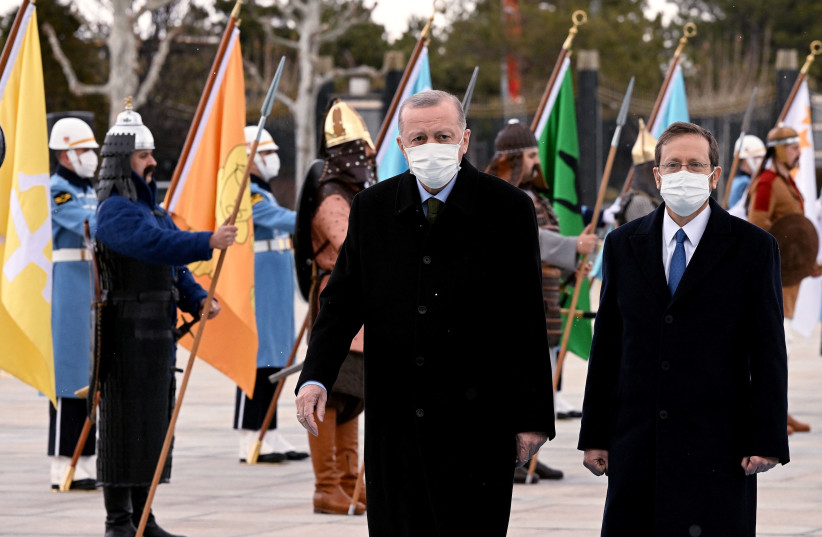Since April, the Mossad has allegedly kidnapped or taken out several Iranian officials associated with its IRGC Quds Force overseas terror Unit 840, as well as aerospace scientists involved in its satellite, nuclear and drone programs.
The strategy would seem to be an all-out blitz to both keep the Islamic Republic far from a nuclear weapon, despite its worrying progress in uranium enrichment, while also hamstringing its ability to respond with overseas terror.
But on Wednesday, Tehran announced that it would soon undertake another satellite launch of its Zuljanah solid-fuel satellite carrier rocket.
Down the road, this could potentially facilitate Iran targeting not only Israel and Saudi Arabia with nuclear weapons, both of which are already in range of the ayatollahs’ existing conventional mid-range ballistic missiles, but also could allow them to hit the US and Western Europe.
Israelis in Turkey

Meanwhile earlier this week, Israelis had to suddenly dash out of Turkey evacuation-style, when Iran’s terror matrix there went passed a certain point of danger.
All of this takes place one week into IAEA Director-General Rafael Grossi’s self-established deadline of the first week of July for Iran to switch his agency’s nuclear surveillance cameras back on, lest the growing gap in data make any return to the 2015 nuclear deal obsolete.
So who has the momentum, Israel or Iran?
Iranian Air Force scientist Mohammad Abdous from the IRGC Aerospace Unit was killed “during a mission” at the Semnan Air Defense Base in northern Iran, state-owned Fars News Agency reported earlier this week.
Abdous reportedly worked on the Islamic Republic’s satellite program, in addition to developing UAVs and ballistic missiles as part of his work in the air force.
He was killed within 24 hours of another Iranian aerospace official.
Iran’s nuclear archives, which the Mossad raided in 2018, revealed that Tehran was preparing two potential nuclear underground test sites in Semnan province.
These latest assassinations may have been plotted to set back Iran’s nuclear program immediately after having preemptively body-slammed its overseas terror infrastructure for retaliating.
The abduction of IRGC Unit 840 official Mansour Rasouli in April was said to have disrupted a plot to target an Israeli diplomat in Turkey, an American general in Germany, and a journalist in France.
Then senior IRGC Unit 840 official Hassan Sayad Khodaei was assassinated in his car outside his home in central Tehran by two assassins on a motorcycle, alleged by Iran to be Mossad agents.
A week later, IRGC Unit 840 Colonel Ali Esmaelzadeh, who served with Rasouli and Khodaei, died after falling from the balcony of his home in the Jahan Nama area of Karaj.
The implication was the IRGC liquidated him as the potential mole who had helped Israel track down his two colleagues.
And yet all of this may only have been to set a more favorable playing field for Israel to hit the nuclear and drone scientists, including Abdous, Ali Kamani and Ayoob Entezari.
Despite these alleged Israeli “wins,” an Iranian defense official said on Wednesday that three test launches of the Zuljanah rocket had been planned, with one test launch already having taken place last year under vague circumstances, and two more test launches planned.
If the ayatollahs launch another dud, as has been with most of their satellite launch attempts, then Israel has less to worry about and maintains the upper hand.
A new kind of space race
But in December and in March, Iran attempted space satellite launches, which Israel, the US and others worry could help develop the same skills needed for firing and delivering an intercontinental ballistic missile with a nuclear warhead.
In 2020, the Islamic Republic unexpectedly successfully launched a satellite into space.
Also, in 2020-2021, Tehran unexpectedly nailed down how to operate advanced centrifuges like the IR-4 and IR-6, after years of failing to do so and being stuck using the much slower IR-1 and IR-2.
What if Iran reproduces its sudden success after years of failure with satellites, like it did with advanced centrifuges?
The technologies are completely unrelated, but the idea of trial and error for a long time leading to success is a time-honored principle for those who are patient.
Add in that there is no sign that Tehran is ready to turn back on the IAEA cameras, and all of Israel’s alleged recent successes may be only tactical wins compared with strategic progress for Iran.
The coming weeks will reveal a lot.
